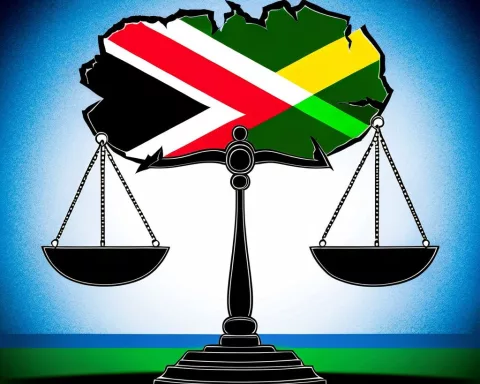Ms. Nosiviwe Mapisa-Nqakula resigned as the Speaker of the National Assembly and a Member of Parliament due to her strong belief in the credibility and responsibilities of Parliament and the laws of South Africa. Her resignation has caused a significant shake-up in South African parliamentary politics and sparked much analysis and conversation. Understanding the role of the Speaker in the legislative process is crucial in appreciating the weight of her resignation. Despite the transition, the Parliament remains dedicated to the service of the South African people and the preservation of the country’s legal structure.
Why did Ms. Nosiviwe Mapisa-Nqakula resign as the Speaker of the National Assembly?
Ms. Nosiviwe Mapisa-Nqakula resigned as the Speaker of the National Assembly and a Member of Parliament due to her deep-seated respect for the credibility of Parliament, its responsibilities, and the laws of the Republic of South Africa. She saw her resignation as the most appropriate action to maintain the respected standing of Parliament.
In the political landscape, dramatic changes occasionally transpire, causing a disturbance in the well-established political structure. A notable example of such a transformation is the recent resignation of Ms. Nosiviwe Mapisa-Nqakula, the ex-Speaker of the National Assembly. This substantial event has sparked an abundance of analysis, retrospection, and conversation.
On the 3rd of April 2024, the Parliament of the Republic of South Africa made an official announcement regarding this significant transition. Ms. Mapisa-Nqakula stepped down from her dual positions as the Speaker of the National Assembly and a Member of Parliament, a decision that was effective immediately. Her resignation letter, directed to the Acting Speaker, Mr. Lechesa Tsenoli, provided insight into her rationale and the principles that guided this crucial decision.
A deep-seated respect for the credibility of Parliament, its responsibilities, and the laws of the Republic of South Africa emerged as primary factors steering her decision. Her farewell highlights her steadfast dedication to these principles. She perceived her resignation as the most appropriate action to maintain the respected standing of Parliament.
The Dynamics of Parliamentary Proceedings and the Role of the Speaker
Understanding the intricate dynamics of parliamentary proceedings is crucial for appreciating the weight of her resignation. The Speaker’s chair is not just a duty but represents authority, responsibility, and service. The individual who holds this position guarantees the smooth operation of the National Assembly, the legislative body responsible for developing the country’s laws.
As the Speaker, Ms. Mapisa-Nqakula was an essential component of this legislative process since 19 August 2021. However, her dedication to Parliament extends over three decades, demonstrating her enduring commitment to national service.
The Acting Speaker of the National Assembly, in recognition of her exceptional contribution, expresses his appreciation to Ms. Mapisa-Nqakula. He admires her robustness, her dedication to the nation, and her distinct role in shaping the legislative conversation during her 30-year tenure. Her impact on the National Assembly and her commitment to her Speaker’s role will indubitably leave a lasting impression on South Africa’s political annals.
Transition and Continuity in the Parliament
During this significant shift, Deputy Speaker Mr. Lechesa Tsenoli retains his position as Acting Speaker of the National Assembly. Despite the challenges and obligations that this transition brings, the Parliament remains steadfast, firmly dedicated to the nation’s laws and the service of the South African people.
As an interesting side note to this story, it’s noteworthy that the official version of an Act of Parliament, endorsed by the President, is securely kept in the Constitutional Court. This detail gives us an insight into the meticulous process involved in the preservation of South Africa’s legislative documents, reflecting the high regard for the country’s legal structure.
Concluding Thoughts
In summary, the resignation of Ms. Mapisa-Nqakula encapsulates the dynamic and often unpredictable nature of the political arena. Despite signaling the end of a period, it also ushers in new leadership and possibilities. The grit and the unwavering dedication to principles exhibited by Ms. Mapisa-Nqakula throughout her tenure serve as a model for future incumbents, ensuring that the tradition of dedicated national service continues.
What is the role of the Speaker in the legislative process?
The Speaker is responsible for ensuring the smooth operation of the National Assembly, the legislative body responsible for developing the country’s laws. The Speaker’s chair represents authority, responsibility, and service, and the person who holds this position has a crucial role in shaping the legislative conversation.
How long did Ms. Mapisa-Nqakula serve as Speaker of the National Assembly?
Ms. Mapisa-Nqakula served as Speaker of the National Assembly from 19 August 2021 until her resignation on 3 April 2024. However, her dedication to Parliament extends over three decades, demonstrating her enduring commitment to national service.
Who is the Acting Speaker of the National Assembly after Ms. Mapisa-Nqakula’s resignation?
Deputy Speaker Mr. Lechesa Tsenoli retains his position as Acting Speaker of the National Assembly during this transition period.
How does Ms. Mapisa-Nqakula see her resignation?
Ms. Mapisa-Nqakula sees her resignation as the most appropriate action to maintain the respected standing of Parliament, reflecting her deep-seated respect for the credibility of Parliament, its responsibilities, and the laws of the Republic of South Africa.
What is the significance of the official version of an Act of Parliament being kept in the Constitutional Court?
The official version of an Act of Parliament, endorsed by the President, is securely kept in the Constitutional Court, reflecting the meticulous process involved in the preservation of South Africa’s legislative documents and the high regard for the country’s legal structure.
What is the Parliament’s dedication during the transition period?
Despite the challenges and obligations that this transition brings, the Parliament remains dedicated to the nation’s laws and the service of the South African people, ensuring continuity in its service.












